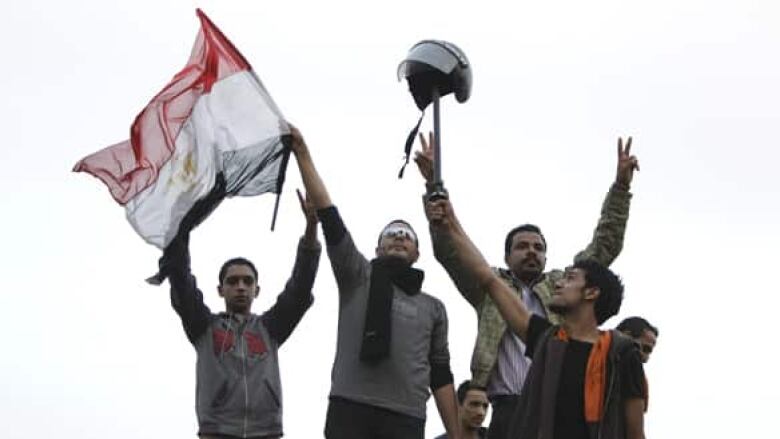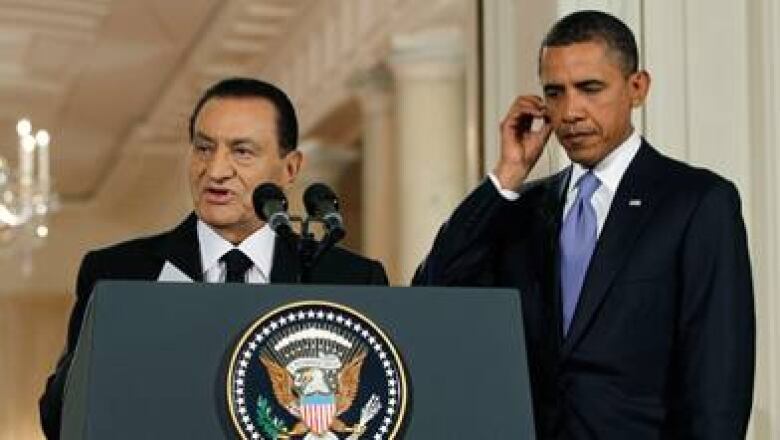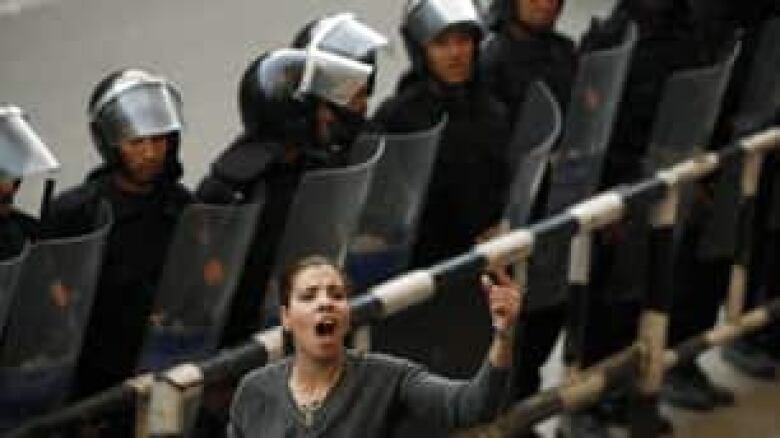What's at stake for U.S. in Egypt uprising

The political ructions are of immediate concern to the countrys 80 million citizens, but they are also being keenly followed by the United States, one of Egypts strategic allies.
Earlier Friday, U.S. Secretary of State Hillary Clinton made a public statement urging restraint on all sides and also advised Egypt's government to respect human rights and the desires of its citizens for reform.
More onEgypt uprising
ButThursday night, U.S. vice-president Joe Biden told PBS NewsHour, "I would not refer to [Mubarak] as a dictator."
Americas murky response to events in Egypt is an indication that if the protests unseat Mubarak, it could affect U.S. interests in the region.
Egypt has been "the intellectual heart and soul of the Arab world," says Robin Wright, author of Dreams and Shadows: The Future of the Middle East. "As a trendsetter, it has influenced everything from the dominant ideology in the region to relations with Israel. For the United States, there is a lot at stake."
During the Cold War, the U.S. courted Egypts favour, largely because of its ideological sway in the region.
In the 1970s, Egyptian president Anwar Sadat moved away from the Soviet Union and in 1978, became a partner in the Camp David Accords, which formalized Egypts recognition of Israel and began the Arab-Israeli peace process.
"Egypt has been able to talk to all parties in the conflict at times when the United States hasnt been able to whether its the PLO in the old days or Hamas today," says Wright.
"And Egypt also has the authority, the gravitas, to be taken seriously in the Arab world. So, as an interlocutor, no other country has come close to playing that role."
A series of cables newly released by WikiLeaks reveals the delicate nature of American relations with a regime widely viewed as totalitarian. According to the leaked correspondences, the Obama administration has eased public criticism of Egypt in favour of private pressure for reform.

"[The Obama administration] is running a foreign policy that is based on a rigid or weird interpretation of what political realism is," says Aurel Braun, professor of international relations and political science at the University of Toronto.
"That is to say, they operate on the belief that it doesnt matter what kind of regime it is, as long as you have good relations with them. If its oppressive, we just look the other way.
"The Egyptian government has been a good friend of the United States but not the people, who have a negative view of the United States for supporting the regime. And that could be a problem."
Obamas administration has taken a markedly different tack than that of George W. Bush.
In a speech to the National Endowment for Democracy in Washington in 2003, Bush bemoaned the "freedom deficit" in the Middle East and called on Egypt to "show the way toward democracy" in the region.
" Saying something behind the scene these regimes have been told for decades, Well, wed like to see such-and-such political prisoner released, or Wed like to see freedom of the press has little impact," says Wright.
"Sometimes, unless you say something publicly, it has little effect. Bushs comment after his speech at the National Endowment of Democracy in 2003 actually inspired a lot of activists in Egypt. They said, A-ha, the U.S. is behind us. And yet, nothing happened."

In his interview with PBS, Biden defended his stance by stressing "the actions Egypt has taken relative to normalizing [its] relationship with Israel."
Laila Lalami, a political commentator based in Los Angeles, believes that this is the issue that most worries the Americans.
"You have the United States in a position where it is terrified that who comes next might endanger these [Camp David] accords," says Lalami. "Thats why I think the [Americans] have been willing to put up with this clown [Mubarak] for 29 years."
Some observers fear that should Mubarak go, it could force an opening for the Muslim Brotherhood, the ultra-religious movement that comprises arguably the most powerful opposition group in Egypt and has openly declared war on America.
Wright, however, is cautious about drawing conclusions this early into the demonstrations.
"Egypt gets an enormous amount of aid from the United States, and given the economic malaise [in Egypt], its not in a position to walk away from that alliance," she says.
"I think we should be careful about predicting what the Egyptians are going to do on foreign policy when we dont even know whether the Mubaraks are going to go and who might replace them."












_(720p).jpg)


 OFFICIAL HD MUSIC VIDEO.jpg)
.jpg)



























































































